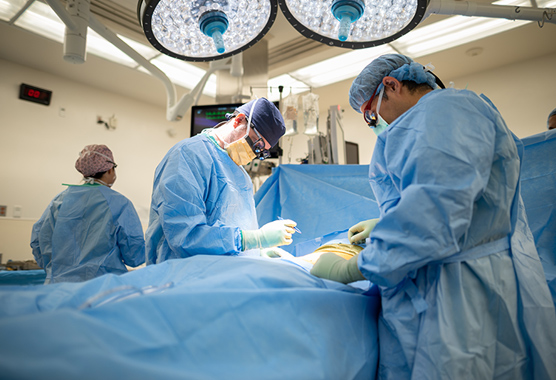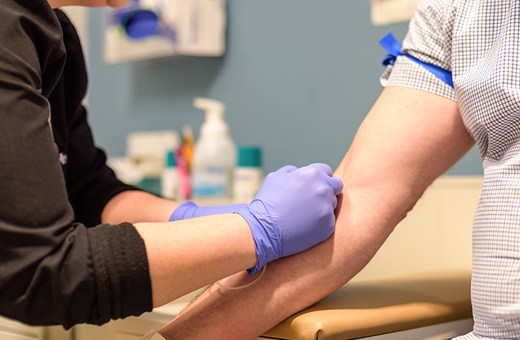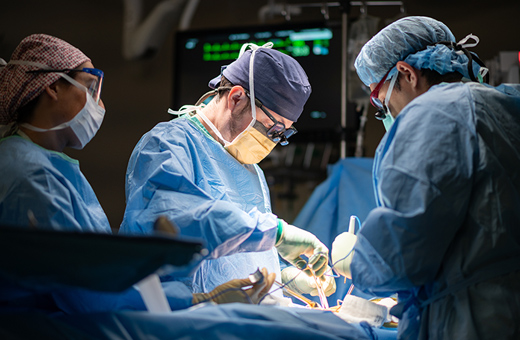Heart Transplant
UC Davis Health offers the most advanced options for people with end-stage heart failure.
Medically reviewed by Bob Kiaii, M.D. on Sep. 05, 2023.

Timely, Leading-Edge Care
A heart transplant involves removing and replacing your damaged heart with a healthy heart from a deceased donor. About 4,000 people in the U.S. receive new hearts each year.
UC Davis Health offers a complete continuum of services for heart failure, including heart transplant. Our Heart Transplant Program includes cardiothoracic surgeons, heart transplant cardiologists, advanced practitioners, transplant coordinators and nurses. You also receive support from our financial coordinators, social workers, dietitians and pharmacists. We coordinate closely with the Comprehensive Heart Failure Program to ensure you receive the right level of care at the right time.
Request an Appointment
As Sacramento's No. 1 hospital, you'll benefit from unique advantages in primary care and specialty care. This includes prevention, diagnosis and treatment options from experts in 150 specialties.
Referring Physicians
To refer a patient, submit an electronic referral form or call.
800-4-UCDAVIS
Patients
Call to make an appointment.
Consumer Resource Center
800-2-UCDAVIS
Heart transplant includes an in-depth evaluation, surgery and ongoing follow-up care. At each step, our team is by your side to help you live your best possible life.
-

Evaluation
You receive a comprehensive assessment to determine your eligibility for a heart transplant. You meet with our specialists and have blood and imaging tests. Our selection committee reviews this information and decides if you meet the criteria (standards) for heart transplant.
-

Waiting List
If you’re eligible for a heart transplant, we add you to the national waiting list through the United Network for Organ Sharing (UNOS). While you wait, our caring support specialists are available to help you and your family cope.
-

Surgery
When your donor heart becomes available, our team works quickly. We prepare you for surgery while a procurement team, including a surgeon and other team members, travels to pick up the heart. Surgery typically takes 6 to 12 hours, and most people spend about two weeks in the hospital. You may need to have further rehabilitation in our cardiac rehab program to recover more and gain strength.
Home Care After Heart Transplant
Going home after heart transplant surgery can feel overwhelming. Our team helps you and your caregiver understand how to manage your care. If you have any questions or problems, we are available 24 hours a day.
Continue Your Medications
You will need lifelong immunosuppression medications to prevent rejection of your new heart. Although these medications are essential, they can increase your risk of infection. Talk to your transplant team about how you can reduce your risk of harm to your new heart.
Keep All Check-Up Appointments
Routine appointments help us track your progress. At first, you see us weekly for blood and imaging tests, including a heart biopsy, to rule out infection. Later, we reduce your visits to monthly, then yearly. At these follow-up visits, we check for signs of infection or rejection and side effects of your medication.
Make Lifestyle Changes
We work closely with you to help you take care of your new heart. You will need to eat a healthy diet, get the right amount of exercise and stay smoke-free. If you want support, our nurses and social workers are ready to assist you.
When to Contact Your Surgeon
Contact your transplant team if you have any signs of infection or organ rejection. These include a temperature higher than 101 degrees F or blood pressure higher than 160/90 or lower than 100/60. Be alert for sudden weight gain, fatigue, shortness of breath and dizziness. You know your body best. If you feel something isn’t right, let your care team know right away.
"National Data," Organ Procurement and Transplantation Network, https://optn.transplant.hrsa.gov/data/view-data-reports/national-data/#

Ranked among the nation’s best hospitals
A U.S. News & World Report best hospital in cardiology, heart & vascular surgery, diabetes & endocrinology, ENT, geriatrics, neurology & neurosurgery, and pulmonology & lung surgery.

Ranked among the nation’s best children’s hospitals
U.S. News & World Report ranked UC Davis Children’s Hospital among the best in pediatric nephrology, orthopedics*, and pulmonology & lung surgery. (*Together with Shriners Children’s Northern California)

Ranked Sacramento’s #1 hospital
Ranked Sacramento’s #1 hospital by U.S. News, and high-performing in aortic valve surgery, back surgery (spinal fusion), COPD, colon cancer surgery, diabetes, gynecological cancer surgery, heart arrhythmia, heart failure, kidney failure, leukemia, lymphoma & myeloma, lung cancer surgery, pacemaker implantation, pneumonia, prostate cancer surgery, stroke, TAVR, cancer, orthopedics, gastroenterology & GI surgery, and urology.

The nation’s highest nursing honor
UC Davis Medical Center has received Magnet® recognition, the nation’s highest honor for nursing excellence.

World-class cancer care
One of ~59 U.S. cancer centers designated “comprehensive” by the National Cancer Institute.

A leader in health care equality
For the 13th consecutive year, UC Davis Medical Center has been recognized as an LGBTQ+ Healthcare Equality Leader by the educational arm of America’s largest civil rights organization.
